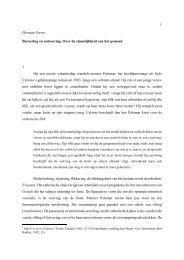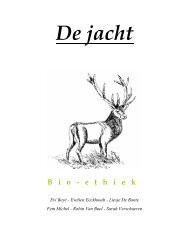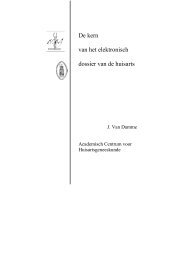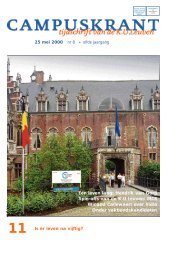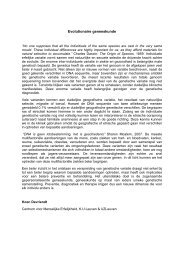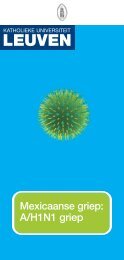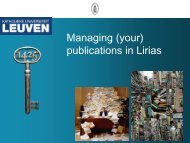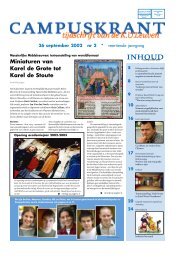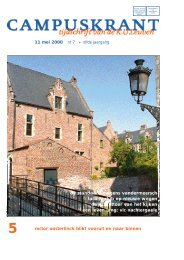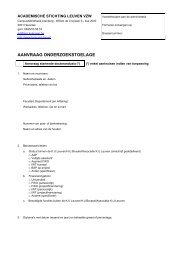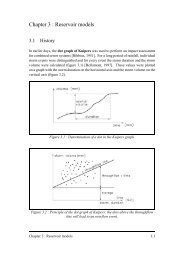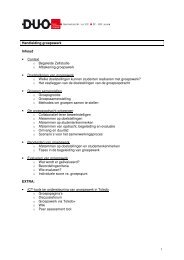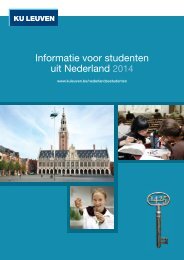EQUALITY GUIdE - KU Leuven
EQUALITY GUIdE - KU Leuven
EQUALITY GUIdE - KU Leuven
You also want an ePaper? Increase the reach of your titles
YUMPU automatically turns print PDFs into web optimized ePapers that Google loves.
180 Equality Guide<br />
1.1. Problem definition<br />
“You must seize the chances you get and create sometimes those chances yourself.<br />
Women have the tendency to stay where they are. They are too loyal, too expectant<br />
and too satisfied. The glass ceiling is not situated at the top, but on the floor, to which<br />
everyone remains stuck.” 199<br />
Female researchers insufficiently reach the university top. The problem is that the qualities<br />
for being a good researcher are not necessarily the same as the qualities that are<br />
needed to build a career.<br />
There are all kinds of theories concerning the glass ceiling, old boys’ networks, and the<br />
career barriers for women. This module however will study the issues women can work<br />
on, if they want to get to the top and the focus is on the role of communication skills.<br />
What can we learn from women who have reached the top? How did they succeed?<br />
Which competencies do they have? What did they have to learn?<br />
1.2. Context UA<br />
The University of Antwerp chose the topic of gender and communication and the organization<br />
of communication trainings for female researchers. This choice was based on<br />
the fact they already had many years of experience in training academics in communication<br />
skills in the context of the WeCom-project 200 . In the spring of 2000, the WeComproject<br />
initiated trainings for scientists in communication with non-professionals and<br />
the general public. More and more scientists need to communicate with non-professionals<br />
such as potential sponsors, governments, partners, journalists, young people or<br />
the general public. The WeCom-courses are practice-oriented and interactive. Together<br />
with other scientists, they improved their communication skills. Five modules were<br />
developed: two basic modules ‘Clear and persuasive writing for the general public’ and<br />
‘Clear and persuasive speaking for the general public, before camera and microphone’,<br />
199 Proposition of Ilja van Haaren (business woman of the year 2002 in the Netherlands) on the Internet<br />
forum http://www.empowervrouwen.nl/manvrouw/index.php?id=28,135,0,0,1,0.<br />
200 www.wecomproject.com.<br />
WeCom also offers the workshop ‘Communication management for scientific communicators of scientific<br />
research institutions’ and published a series of books on scientific communication:<br />
! ‘Wetenschap en communicatie, hoezo?’ by Ann Van der Auweraert, project leader of ‘Wetenschap<br />
en Samenleving in Interactie’.<br />
! ‘Spreken voor een volle zaal’ by Bob De Groof. Bob De Groof teaches communication techniques<br />
at different training institutes.<br />
! ‘Een doeltreffend radio- of televisie-interview’ by Bob De Groof.<br />
! ‘Wetenschap communiceren met medialand’ by Jos Huypens. He teaches Communication<br />
Sciences, is a Wecom-teacher and runs an office for communication advice.<br />
! ‘Populair-wetenschappelijk schrijven’ by Ann De Ron, biologist, freelance journalist and teacher<br />
WeCom.



